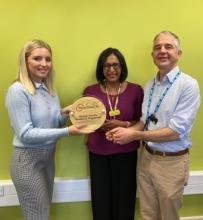
NBT has received a national award for its commitment to patients living with incurable blood cancer, for the second time.
The haematology team was presented with the Myeloma UK Clinical Service Excellence Programme (CSEP) Award on Thursday 13 October in recognition of its outstanding care and unflagging dedication to patients with myeloma.
Myeloma is an incurable blood cancer which claims the lives of 3,000 people in the UK each year.
This is the second time NBT has received the award, which is only handed to a select few hospitals every four years.
Staff were praised for their efforts to improve patients’ quality of life and make clinical trials accessible to as many as possible.
Suriya Kirkpatrick, Senior Haematology Research Nurse at Southmead Hospital, said: “We are proud to receive the Myeloma UK CSEP award for clinical excellence. We are fortunate to have a dedicated team of healthcare professionals who are passionate about caring for people with myeloma.
“Despite the challenges we faced following the COVID-19 outbreak we have been able to continue delivering high-quality care. This award recognises the efforts made by the whole team to maintain high standards and adapt how care is delivered to meet the needs of our patients.”
Myeloma is especially hard to spot as its symptoms are often vague and dismissed as ageing or other minor conditions. By the time many patients are diagnosed their cancer has advanced and they require urgent treatment.
This can significantly impact their chances of survival and quality of life.
The accolade, awarded by charity Myeloma UK, recognises hospitals’ commitment to raising the bar for treatment and providing compassionate and personalised care to patients.
Flora Leonard, Clinical Practice Services Senior Projects Officer at Myeloma UK, said: “To be able to present this award to the team on what is our charity’s 25th anniversary has made this occasion even more special and has truly allowed us to reflect on and appreciate how much headway has been made in the treatment of myeloma over the past two decades.
“Myeloma is a complex cancer which can be challenging to manage, and we were extremely impressed by the haematology department’s willingness and ability to offer bespoke care and make sure no patient is left behind. Research nurses, for example, go the extra mile to ensure that patients have access to clinical trials and provide crucial information and support to anyone considering or already taking part in a trial. This is especially important for newly diagnosed patients, who have a large amount of information to absorb about their diagnosis and may be too overwhelmed to fully get their minds around the benefits of potential trials.”
She added: “The team also collaborates with other departments like the spinal services, which means patients get quick access to the specialist care they so desperately need. This is absolutely vital because the later myeloma is diagnosed, the more likely people are to suffer from severe and debilitating complications like broken spines.”
Phyll McVeigh, 75, from Yate was diagnosed with myeloma earlier this year after experiencing fatigue and breathlessness, which she’d initially put down to living with a heart condition.
She has been receiving treatment at Southmead Hospital since the end of February and credits the hospital for allowing her to lead as normal a life as possible.
“I’m so delighted they’ve received this award,” said the retired nurse, who worked at Bristol Royal Infirmary. “I can’t fault my care. If you don’t have good health, you’ve got nothing. They make sure I can live my life, slower, but live my life. Being a nurse myself it feels like going back and chatting to friends and colleagues. They’ve all been amazing.”
The mother-of-two had been feeling unusually tired for some time but dismissed it as a by-product of ageing.
When she started to struggle to cycle up the road and felt so breathless at the pool that she had to give up after barely half a length, she knew something wasn’t right.
As Phyll has suffered all her life from a heart condition, she initially assumed it was a side-effect of taking beta-blockers.
By January it was clear her symptoms were the tell-tale signs of the incurable blood cancer myeloma.
“To be diagnosed with myeloma at 75 was quite a shock,” recalled Phyll. “It’s been a learning curve and as a trained nurse I really appreciate what they’ve done for me.”
She was able to join a clinical trial and is now on her eighth cycle of chemotherapy. Thankfully, her cancer is now stable.
“The fact that I see the same people from the trial team every time has been invaluable,” she added. “For me being in a trial is a bonus. I feel I’m doing something positive to help future patients. Without trials we couldn’t find any new treatments or show that a drug is working.”
Phyll has been heartened to see how far research into new treatments has come in the span of a few short years.
Just 25 years ago, when Myeloma UK was first launched, there was no treatment for myeloma and patients’ life expectancy was 12-24 months.
Thanks to Myeloma UK’s tireless campaigning and a whopping £19 million poured into vital research towards much-needed drugs, there are today 12 treatments available and patients’ life expectancy has quadrupled.
“Myeloma is not a death sentence anymore,” she said. “You can live with this cancer in a better way than ever before. The production of treatments is far quicker. I’m very optimistic. I’m so grateful I’ve been able to get a treatment that will keep me well and all credit goes to the team. It’s wonderful to have such a service. I’m blown away by it. Until you’ve been on the receiving end of it, you don’t realise how incredible it is and what a difference it can make to your life.”
More information about NBT’s Blood Disorders Current Research
